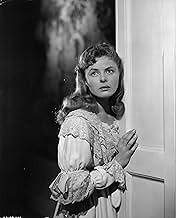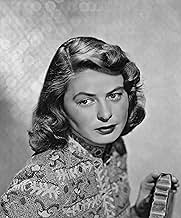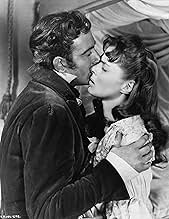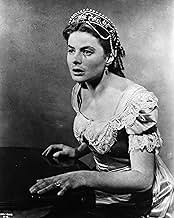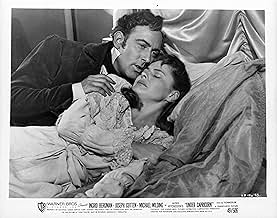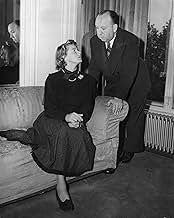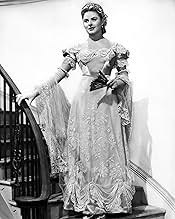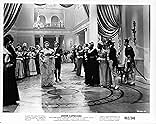Un jeune homme se rend en Australie où il retrouve son amour d'enfance maintenant mariée, mais découvre qu'elle est devenue une alcoolique et cache de sombres secrets.Un jeune homme se rend en Australie où il retrouve son amour d'enfance maintenant mariée, mais découvre qu'elle est devenue une alcoolique et cache de sombres secrets.Un jeune homme se rend en Australie où il retrouve son amour d'enfance maintenant mariée, mais découvre qu'elle est devenue une alcoolique et cache de sombres secrets.
- Réalisation
- Scénario
- Casting principal
- Récompenses
- 3 victoires au total
- Major Wilkins
- (as Francis de Wolff)
Avis à la une
I leave the debate over whether this is Hitchcock's worst film to those that debate such things and try to list everything comparing apples and potatoes seemingly for the sake of it. As surprising as it may be, I'm not one of those but I can understand why this film has been labelled such by others because it is surprisingly run-of-the-mill for that great director. The story is soapy etc on the surface but it had great dark potential with so many threads and emotions floating around. It is surprising then that none of them are made more of and the film just sticks with the genre by becoming nothing more than an acceptable period melodrama. There is still just about enough about it to make you remember that this was from Hitchcock but I was disappointed by how straight-down-the-line it actually was in the end. The direction is still good though, with nice camera movements and shots, and the sets are colourful enough to fit the genre (if not the spirit of birthing Australia).
The cast try hard but nobody can lift the material all by themselves. To his credit, Cotton tries hard with a brooding and dark performance but he can't do it alone. Bergman is good and could have done wonders with a much more complex character, in the end what she has to deliver is nothing special and just melodrama. I didn't care for Wilding; his performance wasn't up to much and I dn't think he eld his own that well alongside Cotton and Bergman. Support from Parker and Leighton is solid but they aren't given that much to do.
Overall then this is a serviceable enough melodrama but it is easy to see why fans of Hitchcock would be forgiven for expecting more to have been made of it. The cast is good and the potential is there in the story but, aside from a steady hand and a few interesting touches, this is really just a genre melodrama that could have been more than it was.
Joseph Cotton was appealing, even though his character throughout much of the movie seemed to be villainous, and his reasons for being that way were quite apparent by the end of the film. My suspension of disbelief centered around Bergman's casting as an Irish aristocrat: once in awhile she managed to say a word that had an Irish flavor, but mostly she just sounded Swedish. However, that did not detract at all from her usual thoughtful performance. Michael Wilding irritated me a little with his foppish ways, yet even he managed to come off as a human being with faults and virtues...just like the rest of us. Leighton was superb and she, like Cotton, seemed to be a treacherous yet sympathetic character. I think it was the portrayals of complicated people with no one being painted as totally good or bad, the nuanced characterizations that I found so artistic yet real.
If you approach this movie without preconceptions, you might be drawn into it and appreciate Hitchcock's genius in an entirely different way.
Irish aristocratic lady Henrietta (Bergman) elopes to Australia with her cruel lover Sam Flusky (Cotten). She gradually develops the illness dipsomania, what with her lover controlling her every move with over-bearing authority and their maid Milly (Leighton) plying her with drink. A childhood friend of Henrietta's, Charles Adare (Wilding) turns up and, realising pretty quickly that all is not well, tries to help her regain a sense of stability.
The film is a laughably overwrought costume melodrama, totally ill-suited to Hitchcock's playful, suspenseful directing style. A year previously, the director had made the thriller Rope, using experimental ten minute takes, and in this film he still seems to be in the habit of allowing scenes to go on and on (maybe not ten minutes, but some bits last for six or seven minutes without a single cut). Frequently, the film feels tediously unspooled as a result. The actors seem to over-act much of the time, but it's hard to see how they could've avoided this as much of the screenplay requires them to handle some horribly overripe dialogue and reactions. Under Capricorn is undoubtedly the least interesting film that Hitchcock ever made. Those who try to persuade us that it is a misunderstood masterpiece are, I'm sorry to report, well and truly kidding themselves.
The problems start with the character of Charles Adare (Michael Wilding), a young man who comes to Australia to seek his fortune. He's the type of guy who'd make good comic relief but isn't suited to be the protagonist of a movie: a lazy, cheery, empty-headed aristocrat. Through Charles, we get introduced to some more interesting people: ex-convict Sam Flusky (Joseph Cotten) and his drunken, self-loathing wife Henrietta (Ingrid Bergman). Charles realizes that he knew Henrietta during childhood and tries to rehabilitate her, which causes long-repressed secrets and emotions to come to the surface. But since none of the characters initially engages our sympathySam is brusque, Charles is a lightweight, and Henrietta is a messit's difficult to care about any of this.
Hitchcock experimented with long takes in this movie, most notably an unbroken 8-minute- long monologue where Henrietta finally divulges her guilty secret. In one sense, this is the high point of the movie: a chance to marvel at Bergman's talent as she cycles through her emotional range without the camera ever cutting away. But in another sense, this scene displays everything that's wrong with "Under Capricorn." Henrietta's story is full of exciting passion and violence, but none of that emotion shows up during the rest of the movie. And the performers (including Bergman, Cotten, and Margaret Leighton, who plays a sinister maid) are at their best during their long monologues, not when they interact with one another.
"Under Capricorn" is not a horrible movie, just a dull one, so if you're curious about this anomaly in Hitchcock's catalog, there's no harm in spending two hours watching it. But, certainly, this movie would be forgotten today if anyone else had directed it.
Le saviez-vous
- AnecdotesIn 1958, Cahiers du Cinema (French Film Magazine) voted this movie as one of the ten greatest movies of all time.
- GaffesAs the characters gather for the dinner party, fairly early on in the film, the camera tracks backwards across the dining room. The table has been pushed into the path of the camera by the time it comes into view, but the candlesticks are still shaking severely from the jerking appearance of the table (their shaking lessens as the take continues).
- Citations
[last lines]
Winter: We'll be sorry to lose you, sir.
Hon. Charles Adare: If I may say so, Winter, I'm sorry to go. Not a bad place. It is said that there is some future for it, there must be- it's a big country.
Winter: Then why are you leaving, sir?
Hon. Charles Adare: That's just it, Winter. It's not quite big enough. Bye, good luck.
- Crédits fousOpening credits roll up over a map of Australia.
- Versions alternativesThere is an Italian edition of this film on DVD, distributed by DNA Srl: "SOTTO IL CAPRICORNO (Il peccato di Lady Considine, 1949) New Widescreen Edition + FRAGILE VIRTÙ (1927)" (2 Films on a single DVD, with "Under Capricorn" in double version 1.33:1 and 1.78:1), re-edited with the contribution of film historian Riccardo Cusin. This version is also available for streaming on some platforms.
- ConnexionsEdited into Histoire(s) du cinéma: Fatale beauté (1994)
Meilleurs choix
Détails
- Durée1 heure 57 minutes
- Couleur
- Rapport de forme
- 1.37 : 1
Contribuer à cette page


